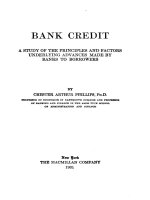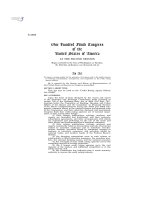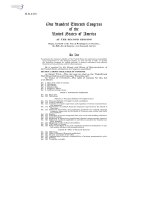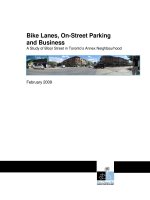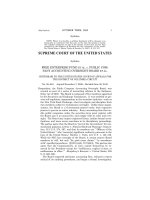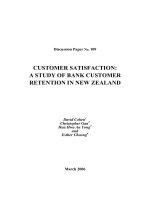Willis the federal reserve a study of the banking system of the united states (1915)
Bạn đang xem bản rút gọn của tài liệu. Xem và tải ngay bản đầy đủ của tài liệu tại đây (7.86 MB, 376 trang )
LIST
MA<
l
uTHE AMERICAN BOOKS
A LIBRARY
OF
GOOD CITIZENSHIP
"The American Books" are
designed
as
a
series of authoritative
manuals,
discussing
problems
of interest in
America
to-day.
THE
AMERICAN
BOOKS
THE
AMERICAN COLLEGE
BY
ISAAC
SHARPLESS
THE
INDIAN TO-DAY
BY
CHARLES
A.
EASTMAN
COST
OF
LIVING
BY
FABIAN
FRANKLIN
THE AMERICAN
NAVY
BY
REAR-ADMIRAL
FRENCH
E.
CHADWICK,
U.
S.
N.
MUNICIPAL
FREEDOM
BY
OSWALD RYAN
AMERICAN
LITERATURE
BY LEON
KELLNER
(TRANSLATED
FROM THB OBRMAN
BY
JULIA FRANKLIN)
SOCIALISM IN AMERICA
BY
JOHN
MACY
AMERICAN
IDEALS
BY
CLAYTON SEDGWICK
COOPER
THE
AMERICAN
SCHOOL
BY WALTER
S.
HINCHMAN
THE
FEDERAL
RESERVE BY
HENRY
PARKER
WILLIS
(For
more
extended
notice
of
the
series,
see the last
pages
of
this
book.)]
The
American Books
THE
FEDERAL
RESERVE
A
Study of
the
Banking
System of
the United
States
BY
HENRY
PARKER
WILLIS
Secretary of
the
Federal
Reserve Board
WITH
AN
INTRODUCTION
BY
CHARLES S.
HAMLIN,
Governor
of
the
Federal
Reserve
Board
v
v
GARDEN
CITY
NEW
YORK
DOUBLEDAY,
PAGE
&
COMPANY
I9IS
Copyright, 1915, by
DOUBLEDAY,
PAGE &
COMPANY
All
rights
reserved,
including
that
of
translation into
foreign
languages,
including
the Scandinavian
PUBLISHED
NOVEMBER,
1915
SECOND EDITION
DECEMBER,
1915
INTRODUCTION
IT
is of
great importance
that
the American
people
should
understand
fully
not
only
the
text
of
the
Federal
Reserve
Act, but,
as
well,
its
history
during
the
process
of
enactment,
and
I
am sure
that this book
will
be read
with
the
deepest pleasure
by
all
who
are
interested
in
the
subject
of
banking.
The Federal
Reserve
Act has
already
been,
and will be
in
the
future,
of
the
greatest advantage,
not alone
to the
bankers,
but to all our
people
who are
the
customers
of
the
banks,
and who
are
engaged
in
agriculture,
commerce,
and
industrial
pursuits.
The
author
points
out that
so far as
expressions
of
opinion
are to be
found
in
the
book,
they
are
expressions merely
of his
personal
views,
but
such
expressions
are
surely
entitled to have
great
weight.
I feel
confident
that
this
book,
both
as
a
history
and
a
searching
analysis
of
the
Act,
will be
an
invaluable
help
to
every
student
of
banking
and
finance.
CHARLES
S.
HAMLIN.
NOTE
HENRY
PARKER
WILLIS
was
born
in
1874
of
New
England
parents,
who
moved to
Racine,
Wisconsin,
when
he was four
years
of
age.
He
lived
in Racine
until seventeen
years
old
when
he entered Western
Reserve
University
at
Cleveland.
He entered
the
University
of
Chicago
a
year
later and
received the
degree
of
B. A. in
1894.
The
University
of
Chicago
appointed
Mr.
Willis
graduate
scholar;
then
Fellow;
and
then
Armour-Crane
Travelling
Fellow
in
Political
Economy.
He
studied
at
Berlin and
Vienna,
then
returned
to
this
country
and
received
the
degree
of
Ph.D. from the
University
of
Chicago
in
1898.
From
1897
to
1898
Mr. Willis
served as
special
assistant
to
the
Indianapolis
Monetary
Com-
mission;
1898-1901
he was
adjunct
professor
and
professor
of Economics
and Politics
at
Washington
and
Lee
University.
In
1901
he
went
to
New
York as
editorial writer for
the
New York
Evening
Post;
then was sent
to Wash-
vii
viii
Biographical
Note
ington
as
correspondent
for the
New
York
Journal of
Commerce and
the
Springfield Repub-
lican.
He returned to
Washington
and
Lee
University
to
organize
the
School of Commerce
there.
In
1906
he resumed
work as
Washing-
ton
correspondent
of
the
Journal of
Commerce,
and
at the same time
joined
the staff of
George
Washington
University
as Professor of
Finance,
and
(in
1910)
became Dean of the
College
of
Political
Science
in
that
institution. In
1912
he moved to New York as Associate
Editor of
the
Journal
of
Commerce,
being
at
the
same
time
a
member of the
staff of Columbia
Uni-
versity.
Mr.
Willis
was
appointed
as
expert
by
the
House
Ways
and
Means Committee
in
1912
and
1913 during
the
preparation
of
the Under-
wood
Tariff. He became
expert
to
the
House
Banking
and
Currency
Committee
when
work
was
begun
on
the Federal
Reserve
Act and
continued
as such until
the
passage
of the Act.
In
1914
he
was
expert
to the
Joint
Committee
of
Senate and
House
on Rural
Credits,
and
was
appointed Secretary
of
the
Federal
Reserve
Board in
September,
1914.
Mr.
Willis
was
for
some
years
American
correspondent
for the London
Economist.
He
Biographical
Note
ix
is
the author of books on
"Principles
and
Prob-
lems of
Banking," "Principles
of
Accounting,"
etc.,
and
monographs
on tariff and
financial
questions.
IN THIS book
I
have,
in
accordance with the
invitation of the editor of the series
in which it
appears,
attempted
to furnish
a brief outline
of the Federal
Reserve Act
and the
operation
of
its
principal provisions.
That
such an out-
line
might
be
intelligible,
it
was
necessary
to include a
brief
introductory
discussion
of
banking
conditions
in
the
United
States,
and
a short sketch
of
the
history
of
the demand
for
banking
legislation,
as well as
of the
reasons
which
ultimately
dictated action. Within the
space
at
my
disposal
it
is
not
possible
to
afford
more
than the
barest
outline
of either
of
these
topics,
or,
in
the
later
chapters
of
the
book,
to
offer
anything
save
general
descriptions
and
analyses
of
the
principal points
involved
in
the
Act.
In
thus
outlining
the
main
aspects
of the
subject,
I
have,
however,
sought
to
provide
a
connected
account
which could be
easily
followed
by
a
reader
without technical bank-
ing
knowledge,
and who
desired
only
so much
zi
xii
Preface
information
regarding
the
subject
as
would
put
him in
touch with the
principal
aspects
of the
banking
situation as
changed
by
the
Federal
Reserve Act.
Deeply
appreciating
the
limitations
upon
the
treatment
imposed
by
the
conditions of
space
and
methods of
analy-
sis,
I
have
nevertheless
endeavored
to
present
the
facts dealt
with
as
accurately
and
in
as suc-
cinct and
connected
a
manner as
possible.
The
Federal
Reserve
System
is in its
early
stages
of
development.
There is still a
wide-
spread
failure
to understand its
real
nature,
and some
tendency
to
make
banking questions
a
subject
of
political controversy.
In the
hope
that a
comprehensible
account of
a
great
con-
structive
statute
may
enable the
general
reader
to form
a correct
opinion
of
it,
and so to
deter-
mine his
attitude
toward
it
in
the
future,
as
well
as
to furnish
him
with a true idea
of
the
system
of
banking
under
which
his
business
affairs
are
carried
on,
the
following pages
have
been
written.
H.
P.
W.
CONTENTS
INTRODUCTION
BY
MR.
HAMLIN
v
PREFACE
xi
CHAPTER
PAGE
I. BANKING
IN THE
UNITED
STATES .
.
3
II. HISTORY
OF
BANKING
REFORM
MOVEMENT
25
III.
THE FEDERAL
RESERVE
ACT
46
IV.
PUTTING
THE
ACT INTO EFFECT .
.
85
V.
OPENING
THE
BANKS
100
VI.
THE FEDERAL
RESERVE
"SYSTEM" .
124
VII.
THE
FEDERAL
RESERVE BOARD
.
.
140
VIII.
THE FEDERAL
RESERVE BANK
.
. .
159
IX.
TYPES OF COMMERCIAL
PAPER . . .
176
X.
THE NEW
BANKS,
THEIR
MEMBERS
AND THE PUBLIC
192
XI. CLEARING AND
COLLECTING CHECKS
.
218
XII.
THE
NEW CURRENCY
ISSUE
.
. ,
239
XIII.
UNIFYING
THE BANKING SYSTEM
. .
256
XIV.
FINANCING FOREIGN TRADE
.
. .
278
XV.
THE
GOVERNMENT AND
THE RESERVE
SYSTEM
297
APPENDIX
313
INDEX
"
333
xiii
I
BANKING
IN
THE UNITED STATES
IN
THE United
States
to-day
three distinct
systems
of
banking may
be
distinguished:
(1)
The national
banking system
organized
under Federal
law.
(2)
The commercial
banking
system organ-
ized under the laws
of the
several
States.
(3)
The
system
of
special
institutions
organ-
ized under State
laws,
and
including
trust
com-
panies,
savings
banks,
building
loan
associations,
and
various others.
It
will
be noted
that the
foregoing
classifica-
tion
is based
upon
the
legal
foundation un-
derlying
the
banking
situation.
A
different
classification
which
might
be
employed
would
recognize
merely
the
following:
(1)
Commercial
banking,
including
both na-
tional
and
State
institutions,
and
among
the
latter,
in
certain
cases,
trust
companies
which
have
specialized
along
commercial lines.
(2)
Non-commercial or
investment institu-
4
The Federal Reserve
tions,
including
some
State
banks,
many
trust
companies,
practically
all
savings
banks
and
building
loan associations.
There are
other classifications and
sub-classi-
fications
that
might
be
adopted
for
various
purposes,
but
the two
thus sketched
are the
most
important
to the
present
treatment,
and
are those
which will
chiefly
figure
in the
follow-
ing
discussions.
Of all the banks
in the United
States,
the
earliest
are the
State
banks
organized
in
the
older commonwealths those on the Atlantic
seaboard.
In
some
of
these commonwealths
there are
institutions
enjoying
special
charters
which run back to the colonial
period.
In
most
of the
States, however,
there now
exist
general
banking
laws
under which
any person
who com-
plies
with
specified requirements
can
organize
a bank.
Wherever
special
charters
prevail
it
is
often found
that
many
broad
powers
are
granted
in
them,
some
dating
from
a time when
the
business of
banking
was
not
clearly
differ-
entiated
from other
occupations.
Wherever
general
banking
laws
exist,
as
they
do
to-day
in
most of the
States,
it will be
found
that care-
ful
descriptions,
limitations,
and
requirements
enter
into the
several
banking
acts,
the
object
Banking
in
the
United
States
5
being
to
define
the classes
of business
in
which
the
various
institutions
whose
incorporation
is
permitted
may legally
engage.
In all
States
where such
statutes
exist
there
is some
pro-
vision
for
very
careful
public oversight
and
inspection
of
the
accounts,
books, cash,
and se-
curities
of
the several
banks.
Banking,
then,
under
whatever
laws
conducted,
and
in
what-
ever
way
it
may
be
specialized,
is
everywhere
regarded]
as a
quasi-public
occupation,
and as
demanding
the
general
oversight
and
partici-
pation
of
the
public
authorities.
But
what is
banking?
Many
writers
define
a
bank as
an
institution
which
exercises
the
functions
of
discount,
deposit,
and
issue
a
classification
which
yields very
little
insight
because
of the
fact that
such
a
grouping
of
functions is
merely
a
way
of
describing
bank-
ing
as
an
operation
from different
points
of
view.
What
the bank does is
the
same under each of
these
heads there
is
no difference
in
its essen-
tial
performance.
Reduced to
its lowest
terms,
this essential
function
is that of
guaranteeing
the
credit
of
individuals. The
basic
banking
trans-
action
may
be
described
as follows:
A
has
purchased goods
from
B,
and has
given
B
a
document or
"note,"
in which
he
promises

